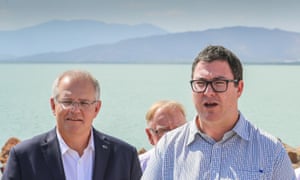There are blue-collar jobs in a post-coal world. That’s the message that needs to be heard by Adani supporters
As
usual after an election comes the commentary that would have you
believe the result was so obvious and that there are a multitude of
lessons to learn (mostly the wrong ones). I won’t prosecute all of them,
but for me the progressive parties need to consider first one specific
seat.
It is the seat of Dawson, held by that most absent and incompetent MP, George Christensen. He is a man who was rather famously found to have spent very much of his time in the Philippines – rather a distance from the Townsville CBD, which touches on the northern end of Christensen’s electorate.
Nothing about his work (or lack of it) over the past three years warranted his re-election and yet there he sits – winner of the largest swing to the LNP in the country.It is the seat of Dawson, held by that most absent and incompetent MP, George Christensen. He is a man who was rather famously found to have spent very much of his time in the Philippines – rather a distance from the Townsville CBD, which touches on the northern end of Christensen’s electorate.
Now he himself did not get much of an increase in the primary vote; the big increase was to One Nation (in 2016 they didn’t bother running a candidate in the seat). You could say Clive Palmer’s party picked up a lot of votes but, to be honest, with just 4,000 votes, almost as many in the seat voted for the Greens as voted for the UAP.
The big issue was the 12% fall in the ALP’s primary vote. Only 20% of voters in the seat put the ALP first. This in a seat which in 2007 the ALP registered 48% of first preferences and even in 2010, when Christensen was first elected, the ALP still garnered 40%.
Clearly the Adani mine was a major factor. And you can understand why – unemployment in Townsville is 7.9% and just a year ago it was at 9.8%. Just under 61% of Townsville men are employed – compared with over 67% in the rest of Australia.
The mine in all likelihood will never actually come to fruition. It is not a profitable proposition, it has no long-term future and most of the argy-bargy around it seems more about Adani not having to write the whole thing off than actually going into production. But it sounds like there will be work, and work that is easy to understand.
And worse, there was no real sense of “what else if not that?”
Green jobs sound wonderful in a Sydney focus group, but to a person who has been unemployed for 40 weeks (the median length of unemployment for those in Townsville over the past year) talk of green jobs sounds a lot less real than the prospect of a mine.
The attitude becomes, “Climate change is bad for tourism, it will kill the reef you say? When? Oh, in a decade or so time? Great, we’ll deal with it then. What about a job now?”
It is why it is good (if extremely belated) to hear Tony Burke suggesting the ALP must treat climate change as an industry policy. They need to show there is a future, because voters will be more likely to ignore the science and believe the snake oil climate-change deniers if they are the only ones who appear to be holding out the promise of a job (however illusory it really is).
The reality is, as has been seen in Whyalla and even in Townsville, there are blue-collar jobs in a post-coal world, but the message still needs much more work to break through.
This does not (and must not) mean giving up on a real targets for reducing emissions – including net zero emissions by 2050 – but it means combining that with a reason to get excited about what will follow.
You may disagree with talk of a Green New Deal, as spruiked by Alexandra Ocasio-Cortez, but as I noted last year, she argues with passion and also excitement for the future. If you can’t get excited about something, you will vote for the fear.
The reality is that the market for thermal coal is dying – BHP said as much this week, and Glencore said much the same back in February. But until there is sense of jobs to take their place, people will still hold out misguided hope that a new mine will save them all.
At this point Greens supporters will scream that they are already doing this – and they are right. Take this announcement by Larissa Waters, in April, of a policy for more than 47,000 jobs to be created by 2030.
But the ALP are not the only ones who need to spend some time in the hall of mirrors after this election. The fact is this election campaign the prime minister treated the Greens with contempt and got away with it.
The Greens vote increased by around 1.5% in the Senate, but most of that came because the collapse of the Nick Xenophon Team left it as pretty much the only option for non-racists or lunatics who didn’t want to vote ALP or LNP. So the Greens really should not cheer too loudly; their improvement came with a few caveats.
The climate crisis is here to stay and only Labor and the Greens will actually do anything, given the denier streak remains in the LNP (Tony Abbott or not).
A post-carbon world economy and green production needs to be the climate-emergency theme of the next three years for both progressive parties, because not only is it the future of our economy, it might even produce some votes.
• Greg Jericho is a Guardian Australia columnist

No comments:
Post a Comment